It’s always a mistake to do anal play without lubrication, hence the need to apply lubricant because it helps reduce friction. Even though there are different brands and models of commercial lube on the market, it’s not always possible to have one around.
So, what do you do when you don’t have lube and you want to have quick anal sex? You improvise! There are various household materials that you can deploy for a homemade anal lube. Not only does a homemade anal lube save you costs, but it also allows you the luxury of using only safe materials. We know that you can’t wait to find out the many options you have for a DIY anal lube and we have no plans to deny you that knowledge. Read on to learn all about household anal lubes.
What’s Special About Anal Lubes
Other than the fact that anal lubes help to reduce friction and pain during anal sex, they have a few other special qualities. Find out what’s special about anal lubes below:
Thickness
If you didn’t know, anal sex is not the only type of sexual activity that requires lube; vaginal sex—mostly in case of dryness of the vagina—may require extra lubrication too for smoother penetration. While thinner lube is ideal for vaginal sex, it doesn’t work for anal sex. The latter requires a thicker lube because anal walls are thinner than vaginal walls.
Whether you’re playing with a butt plug, anal dildo, having sex, or being fisted, you need a high-quality anal lube for a smooth experience. For example, you can count on the best lube for fisting to be more viscous and long-lasting.
Besides, a thicker lube keeps the anal walls more slippery than a thinner lube. This reduces the risk of tears and cuts inside the rectum. And abrasions raise the risk of contracting a Sexually Transmitted Infection (STI). That’s something nobody wants.
Numbing
Another special quality of anal lubes is numbing the anal walls well before sex. They desensitize the anal walls to ease some of the possible discomfort associated with anal sex. With the light numbing effect you get from anal lube, things can be comfortable during the backdoor play.
However, the numbing effect is not entirely safe, no thanks to the benzocaine and lidocaine compounds used in making numbing anal lubes. These ingredients may sometimes cause itching, burning sensations, irritation, or tingling.
Notwithstanding, there are high-quality and safe desensitizing anal lubes on the market and it’s up to you to look in the right places. According to most reviews, the Doc Johnson Rear Entry Desensitising Lube is perfect for extra comfortable anal play. Boasting a slick and thick silicone formula, the lube is easy to use thanks to its pump bottle.
Household Anal Lube
Do you know the most important advantage of homemade lube for anal? It keeps you from rushing to the store or canceling an anal session because you’ve run out of lube at home. Below, we’ll discuss some household items that pass as anal lube that you didn’t know before:
Spit
You’re probably familiar with using your saliva as lube during vaginal sex. It’s also an excellent lube when giving a blowjob. If you didn’t know, spit comes in handy for anal sex too.
Some claim that saliva may harbor some kind of infection but that isn’t true for anal sex. As a matter of fact, saliva does the contrary. It contains antifungal properties that protect against the entry of harmful bacteria—that can cause infections—into your body system. Also, spit is compatible with condoms.
However, we have to admit that spit is nowhere near a top choice for household anal lube. Of course, you can always add more saliva but it’s not just good enough for use as anal lube. This is mostly because it dries quickly which can become a problem during anal play.
Coconut oil
Have you come across coconut oil before? It has one of the best natural smells of any oil. If you didn’t know, you can use coconut oil as anal lube. Not only is coconut oil easy to find, but it’s also comfortable to use. However, we recommend virgin coconut oil or an unrefined variant. Refined oil may contain additives that can irritate sensitive body parts such as the anus.
Furthermore, coconut oil doesn’t combine well with a latex condom because it’s oil-based. Oil-based products typically degrade/rupture latex condoms, exposing you to STIs. However, you can still go ahead to use the oil—without a condom—if you’re having anal sex with a monogamous partner.
Notwithstanding, oil-based lubricants can be quite slick and there are many options on the market. If you don’t mind investing in one, the AH! YES Organic Plant Oil-Based Lubricant seems like an ideal choice as suggested by several users. As you can easily guess from the name, it’s made from an organic plant, making it body-friendly. And the lube boasts a super-slick and long-lasting formula for enjoyable anal play.
Almond oil
Almond oil is another top oil-based natural anal lube. Not only does it boasts rich vitamins and a nice smell, but it also has a special quality of penetrating the skin easily, meaning it’ll hardly create any mess during anal play. Instead of purchasing an expensive anal lube, investing in almond oil can be a smarter choice. You can also have it as an alternative in case you run out of lube.
Also, almond oil is easy to store; you can keep it refrigerated for a long time. However, like coconut oil, almond oil is bad news for latex condoms.
Vitamin E
If you’re familiar with essential oils, then you probably know of “carrier oils”. These oils act as a base for essential oils. Vitamin E oil is among “carrier oils” and it’s effective for use as household anal lube. Not only is the oil slippery, but it also provides a wet and smooth feeling that makes anal play very comfortable and enjoyable.
When it comes to using Vitamin E oil, the same rule applies: the oil is not compatible with condoms. So, you’ll have to choose between going for a safer option or taking an unnecessary risk. However, there’s nothing to worry about if your partner is with you only and you’re sure that their sexual health is great.
Chinese yam
Another option for household anal lube is Chinese yam which is also known as “nagaimo”. As you might have easily guessed, this special type of yam is mostly found in China. It’s also found in Japan and Vietnam. When squeezed, the yam emits a mucous-like, slippery liquid that’s slimy in texture. If you can go through the rigor of having Chinese yam at home, it’s well worth it.
Vegetable or olive oil
You’ve probably never considered the vegetable oil in your kitchen as a good household anal lube. Although it’s not ideal for vaginal sex, it works just fine for anal sex. You most likely already know how slippery vegetable oil can be. The oil’s slippery nature can be perfect for smooth anal penetration.
Another option is olive oil—a natural oil that’s equally found in most homes. Olive oil has many applications that include household anal lube. If you’ll be using this type of oil for anal sex, you should go for the unrefined variant because it’s typically natural without potentially harmful additives.
Like other oils, vegetable and olive oils are not compatible with latex condoms if you’re counting on having safe sex.
Anal Lube Recipes
If you want more options aside from the household items we’ve discussed, there are anal lube recipes that can provide them. Below, we’ll help you learn how to make homemade anal lube:
Aloe Vera + flaxseed oil
If you’re familiar with aloe vera gel, you probably know that it has many applications. It can be used for a homemade anal lube too. And it’s easy to like aloe vera because it has a natural soothing effect and is free of harmful chemicals. Below, we’ll discuss the aloe vera + flaxseed oil recipe:
Ingredients
- Aloe vera
- Flaxseed oil
- Essential oil
- Mixing bowl
Process
- Cut the aloe vera into small pieces and put them in a bowl.
- Get a squeezer to “milk” the pieces into another bowl or a glass. You can add some water if you see the need to.
- Add the flaxseed oil and essential oil (you can skip this oil if you don’t care about the lube’s smell) to the aloe vera gel in the bowl and mix them.
- Transfer the mixture into a container for storage.
- Leave the mixture for 10-12 hours before use. You can keep it refrigerated in your fridge. However, the aloe vera may go bad if it stays for more than a week.
Since the recipe is partly oil-based, it isn’t compatible with latex condoms.
Coconut oil + shea butter
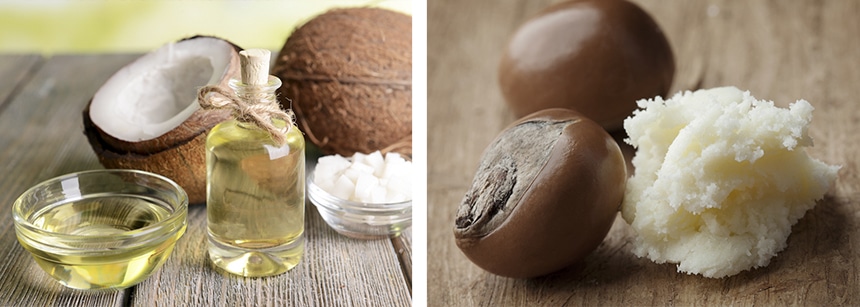
If you’re not looking to use latex condoms for anal sex, the coconut oil + shea butter recipe is a great option to consider and we’ll tell you all about it below:
Ingredients
- Coconut oil
- Shea Butter
- Mixing bowl
- Storing container
- Microwave
Process
- Pour the coconut oil and shea butter into the mixing bowl. The coconut oil should be 75% and the shea butter, 25% of the mixture. Shea butter makes lube thicker.
- Place the bowl inside your microwave. Set the microwave to a low setting and heat the mixture until it’s melted.
- Once melted, pour the mixture inside the storing container.
- Proceed to refrigerate the container until you’re ready to use your newly made anal lube.
However, we advise that you do not store the homemade anal lube longer than a few weeks to avoid it turning bad as it’s without preservatives. Need we mention that this is an oil-based lube that’s not compatible for use with latex condoms? If you’re going to use a condom for anal sex, you should look beyond the coconut nut + shea butter anal lube and consider the recipe we have for you next.
Water + flour
The water + flour recipe is a departure from oil-based homemade anal lubes. As you might have guessed, this recipe is ideal for condom users. Let’s get you acquainted with the recipe below:
Ingredients
- Cold water
- Arrowroot flour
- Pot
- Storing container
Process
- Pour the cold water into the pot and heat it at a medium setting.
- Pour the arrowroot powder into the water and stir until you see a change in the texture (usually gel-like).
- Turn off the heat and pour the mixture into the storing container for storage.
- Let the newly made anal lube cool before storing it at room temperature.
Safety Advice
While thinking about making an anal lube at home, you should also be thinking about safety. You don’t want to insert harmful items inside your anus and cause avoidable trouble for yourself. Below, we’ll discuss some safety precautions you should take before going ahead to use a homemade anal lube:
Allergy check
The human skin is naturally sensitive and many people suffer from allergies due to this. Before using a homemade anal lube for anal sex, you should check if you’re allergic to any of the used ingredients or not.
For example, if you have a nut allergy, applying almond oil could trigger an allergic reaction, says the American Academy of Allergy, Asthma, and Immunology Trusted Source Food allergy: nut oils in topical products AAAAI’s Ask the Expert talks about food allergy: nut oils in topical products. www.aaaai.org . In your search for a cheap, readily available anal lube, never forget to do an allergy check and be sure of the solution’s safety.
No chemicals
Whether you’re making an anal lube yourself at home or you’re buying one at the store, you should never consider an option that includes chemicals. Chemicals can cause all sorts of troubles and you don’t want to experience health issues in your journey to experience sexual pleasure.
If you’re wondering which chemicals to avoid, we have a few for you. You want to avoid glycerin because it causes yeast infection. Propylene Glycol may also cause irritation, so it’s best to avoid it.
Paraben is another chemical you want to stay away from because it causes skin irritation. Although some studies suggest that it also causes breast cancer, there’s not sufficient data to suggest serious consequences from its use according to the United States Food and Drug Administration (FDA). Trusted Source Parabens in Cosmetics | FDA FDA information on cosmetic products and parabens as ingredients in cosmetic products. www.fda.gov Regardless, we advise that you err on the side of caution and avoid the ingredient.
Additionally, L-Arginine can trigger herpes and we’re sure you don’t want to be dealing with that. Overall, stay away from chemicals that have the potential to hurt your skin.
Read ingredients
If you’re buying your anal lube at a store, then there’s a huge possibility of it containing potentially harmful ingredients. The same goes for your homemade products. When you create something used on your body – make sure you’re using 100% pure product.
Some products won’t do
As we mentioned some chemicals to avoid, we must also mention other products that shouldn’t be in your homemade anal lube ingredient list. Never try to improvise using butter as a substitute for anal lube. Why? Butter typically contains milk which is quickly contaminated. You don’t want to develop infections due to using the wrong household anal lube.
Another product that won’t do is fish oil which typically boasts a strong smell that takes some time to fade away. Of course, this type of oil can be a tempting option as anal lube but it’s not worth the stress the smell will make you go through. You don’t want to spend hours in the shower just because of anal sex that lasted less than one hour.
Other products you should avoid include petroleum jellies, eggs, sugars, syrups, and honey.
How to Apply
After finding the right anal lube, applying it correctly is the next thing. Below, we’ll discuss the best way to apply your lube for a smooth anal experience:
- Warm the lube up in your hands before applying it.
- Pour a large amount of lube in the anus and an anal dildo to spread it. The best anal dildo for this should be just the right size. Also, add more lube on the condom (we strongly recommend using a condom for anal sex).
- Put a towel underneath you to prevent the lube from staining your couch, sheets, carpet, etc.
- Reapply the lube whenever it dries up and more is needed.
Final Thoughts
Maybe you’re shy of going to the store or you want a cheaper option: there are various reasons for seeking out a homemade anal lube. As you’ve seen in this article, you’re spoiled for choices when it comes to household anal lubes and homemade recipes.
Even though natural products are typically safe for the skin, you never can tell, so we advise that you perform a skin patch test that tells how your skin reacts to certain ingredients. This move ensures that your safety is intact. And we can’t emphasize this enough: stay away from chemicals. In your journey to formulate a homemade anal lube, do all you can to use only safe items.











